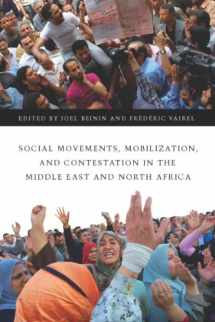
Social Movements, Mobilization, and Contestation in the Middle East and North Africa (Stanford Studies in Middle Eastern and I)
ISBN-13:
9780804775250
ISBN-10:
0804775257
Author:
Joel Beinin, Frédéric Vairel
Publication date:
2011
Publisher:
Stanford University Press
Format:
Paperback
328 pages
Category:
Sociology
FREE US shipping
Book details
ISBN-13:
9780804775250
ISBN-10:
0804775257
Author:
Joel Beinin, Frédéric Vairel
Publication date:
2011
Publisher:
Stanford University Press
Format:
Paperback
328 pages
Category:
Sociology
Summary
Social Movements, Mobilization, and Contestation in the Middle East and North Africa (Stanford Studies in Middle Eastern and I) (ISBN-13: 9780804775250 and ISBN-10: 0804775257), written by authors
Joel Beinin, Frédéric Vairel, was published by Stanford University Press in 2011.
With an overall rating of 4.1 stars, it's a notable title among other
Sociology
books. You can easily purchase or rent Social Movements, Mobilization, and Contestation in the Middle East and North Africa (Stanford Studies in Middle Eastern and I) (Paperback) from BooksRun,
along with many other new and used
Sociology
books
and textbooks.
And, if you're looking to sell your copy, our current buyback offer is $0.52.
Description
The Middle East and North Africa have become places that almost everyone "knows" something about. Too frequently written off as culturally defined by Islam, strongly anti-Western, and uniquely susceptible to irrational political radicalism, authoritarianism, and terrorism—these regions are rarely considered as sites of social and political mobilization. However, this new volume reveals a rich array of mobilizations that neither lead inexorably toward democratization nor degenerate into violence.
These case studies of Morocco, Egypt, Lebanon, Saudi Arabia, and Turkey are inspired by social movement theory, but also critique and expand the horizons of the theory's classical concepts of political opportunity structures, collective action frames, mobilization structures, and repertoires of contention through intensive fieldwork. This strong empirical base allows for a nuanced understanding of contexts, culturally conditioned rationality, the strengths and weaknesses of local networks, and innovation in contentious action in a region where, with the exception of Turkey, there was little sign of broad-based movements for democratization until the Tunisian and Egyptian uprisings of 2010-11.


We would LOVE it if you could help us and other readers by reviewing the book
Book review

Congratulations! We have received your book review.
{user}
{createdAt}
by {truncated_author}


